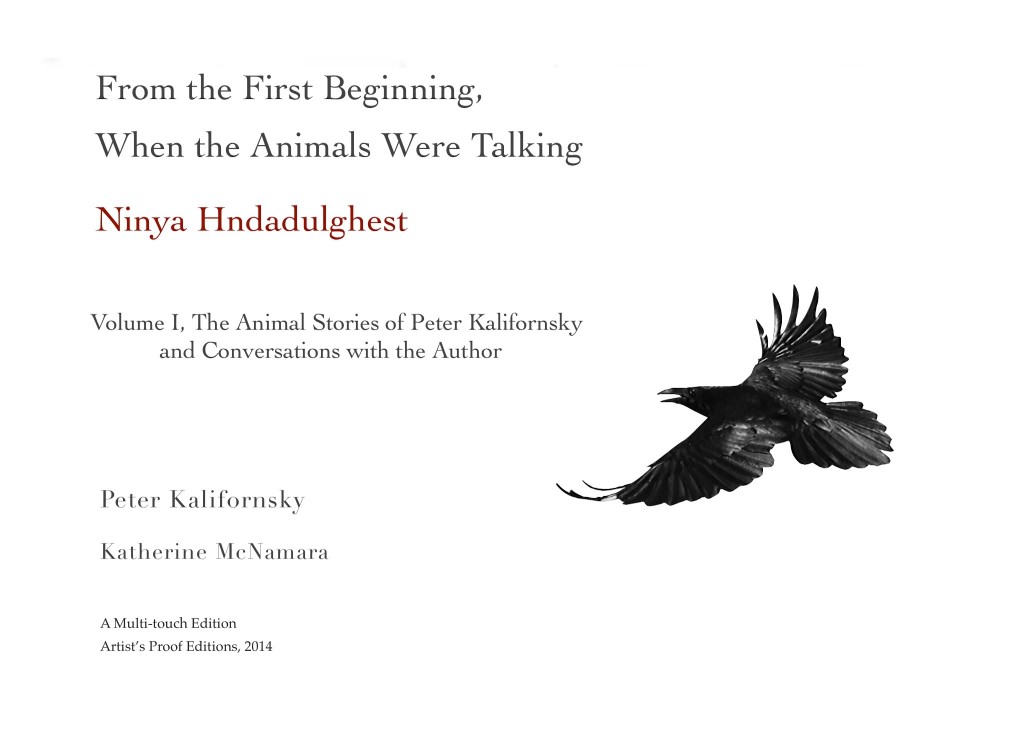The Kalifornsky Project
Peter Kalifornsky was the first writer of his Dena’ina Athabaskan language. Katherine McNamara was his secretary. She is bringing their joint work to the iPad and Mac.

Peter Kalifornsky (1911-1993)
Behind his great book, however, lay another, a shadow-book. Peter Kalifornsky wished to tell the “back story” behind his work. He knew he would not write it; he asked for a secretary. In 1983, a younger poet came to his door. Working together in English over the next four years, they composed new translations of his Dena’ina texts, for he had taken up his pen once more and lengthened his manuscript. Their long conversations turned on writing and meaning, the theory of metaphor, imagination and the nature of the mind, the powers of the animals, the old Den’aina beliefs, their law and regulation, their history. As the young poet asked questions, writing furiously as he spoke, the old author laid out before her the intellectual, cultural, and spiritual history of the Old Dena’ina, all come down to the mind of their first writer.
Peter Kalifornsky described the inner workings of his oral language. Even more remarkably, he explained how the act of writing, itself, taught him aspects he had never considered.
“I wrote that story, yes, in my native language. It’s written; and all I was fighting for was to preserve my native language. But what we’re getting into – how to read the background – gets complicated. From the beginning, the stories were put forward for a people to study, the nations and what-not.”
The author directed the ordering of his translated stories and texts in a new, intricate order of four cycles, or circles, in which the stories “bounced back and forth” between each other. Painstakingly, the young poet then annotated them, edited their discussions into a concordance, and composed a complex, two-volume manuscript. But the manuscript did not appear in print, and Peter Kalifornsky (1911-93) died, having achieved the publication of his Dena’ina writings and, thus, the preservation of his language as he wished it to be remembered.
I was that younger poet. I am bringing our joint work out of the shadows into this borderless digital medium and opening it to new generations. It is called From the First Beginning, When the Animals Were Talking.
— Katherine McNamara
From the First Beginning, When the Animals Were Talking
Volume 1, The Animal Stories of Peter Kalifornsky
Translated from the Dena’ina writings of Peter Kalifornsky by the Author and Katherine McNamara, and Conversations with the Author

The stories say that from the First Beginning the animals talked among themselves and to the humans. They formed partnerships with each other. They called the humans the Campfire People.
From the First Beginning, When the Animals Were Talking
by Peter Kalifornsky and Katherine McNamara
Read more about the multi-touch book for the iPad and Mac
From the Believing Time, When They Tested for the Truth
Volume 2, The Belief Stories of Peter Kalifornsky
Translated from the Dena’ina writings of Peter Kalifornsky by the Author and Katherine McNamara, and Conversations with the Author

“They lived life through Imagination,” Peter Kalifornsky said, “the power of the mind.”
From the Believing Time, When They Tested for the Truth
by Peter Kalifornsky and Katherine McNamara
Read more about this multi-touch book for the iPad and Mac
From the First Beginning: The Journal of the Kalifornsky Project
I post to an online journal about the progress of this project.
Another Dark Night Came Over Me
I’ve been indexing the raw files of Kalifornsky’s cassette tapes, which he recorded at home in 1988, and just found this beautiful, painful dirge.
Peter Kalifornsky’s great-great-grandfather, Qadanalchen, made this song sometime between 1811 and 1821, at Fort Ross. The Russians took — in several senses – a number of Kenai and Kodiak hunters south with them, as hostages as much as foragers. These men lived in the Indian village on the shore below the gates of the fortress.
Peter tells us:
And this is my great-great-grandfather’s ‘homesick’ song, that he made this song when he was taken out to Fort Ross during the Russians’ time. When he get homesick, he would sing this song. They claim that’s the story about him, by the old people.
Qadanalchen K’elik’a* “Another Dark Night Come Over Me.”
Ki q’u ke sha nuntalghatl’.
Q’iłdu ki, qint’a hk’u.
Shesh t’qełani.
Shi k’u ki.
There’s a translation:
Another dark night come over me.
Over back home looks impossible to return.
But do your best for living.
That, I am too.
That was his homesick song.
No services have been added yet.
You must be logged in to post a comment.